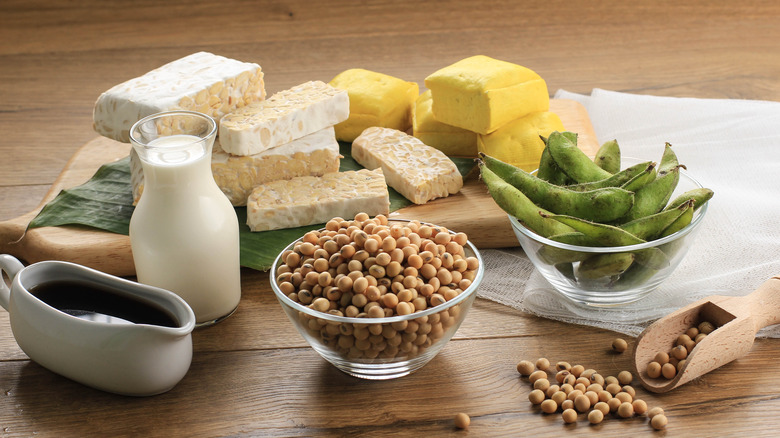Can You Really Use Soy To Treat Osteoporosis?
Osteoporosis is a chronic bone disease, but you can manage its symptoms through lifestyle changes. For starters, try to increase your daily intake of calcium and vitamin D, suggests a 2017 review published in the European Journal of Rheumatology. Health experts recommend about 1,200 milligrams of calcium per day for women over 50 and 1,000 milligrams for men in the same age group, split into 500 to 600 milligrams per dose (via Mayo Clinic). You'll also need at least 600 international units of vitamin D per day to maximize calcium absorption.
The Mayo Clinic also recommends eating plenty of fruits, vegetables, and whole grains. These foods are rich in vitamin A, vitamin K, magnesium, potassium, and other nutrients that promote bone health. Your diet should also include enough protein, especially from vegetable sources like soy, beans, nuts, and seeds. Ideally, try to get about 25% to 35% of your daily calories from this nutrient. Note that each gram of protein has nine calories.
Speaking of soy, this legume is chock-full of calcium, protein, and other key nutrients that keep your bones strong. A 3.5-ounce serving of soybeans offers approximately 36 grams of vegetable protein, 38% of the daily recommended potassium intake, and more than 20% of the daily recommended allowance of calcium. You'll also get large amounts of iron, B-complex vitamins, copper, manganese, phosphorus, zinc, and selenium.
Some claim that soy may help treat osteoporosis — or at least slow its progression, but can you trust these claims? Let's see what the research says.
Soy could be the key to stronger bones
Clinical evidence suggests a positive association between soy consumption and bone health. For example, a 2018 study investigated the effects of soy on female rats with low fitness levels. Animals that consumed soybean meal for 30 weeks experienced a greater increase in bone strength than those eating cornmeal, according to the journal Bone Reports. Researchers believe that soy isoflavones, a class of estrogen-like compounds, may alter the proteins and hormones responsible for bone loss, reduce oxidative stress, and boost metabolic health.
A meta-analysis of nine studies conducted on more than 400 women had similar findings. As it turns out, soy isoflavones may inhibit bone resorption and stimulate ossification, or the formation of new bones. These beneficial effects were observed in women who consumed up to 90 milligrams of isoflavones per day for three months, reports the European Journal of Clinical Nutrition.
In another study, soy protein increased bone formation in postmenopausal women within one year of treatment. However, it didn't prevent osteoporotic bone loss, notes the Nutrition Journal. While previous studies showed that soy may have beneficial effects on bone health and bone mineral density, the research is mixed. Its benefits are "at best inconclusive," say the researchers. However, further studies are needed to determine whether higher soy intakes may reverse bone loss.
Should you add soy to your diet?
Soy is unlikely to treat osteoporosis, but it seems to have favorable effects on bone health. Rich in protein and isoflavones, this legume may help prevent osteoporosis and reduce fracture risk, according to clinical evidence presented in the journal Maturitas. A possible explanation is that soy isoflavones promote bone health due to their estrogenic activity. Estrogen, the primary female sex hormone, increases bone mineral density and protects against bone loss, but its levels decrease as you get closer to menopause.
Leaving these aspects aside, isoflavones are beneficial for overall health, says the Linus Pauling Institute. When consumed as part of a balanced diet, these nutrients may improve blood lipids and vascular function, protect against heart disease, and boost cognition. Some studies also found that diets rich in isoflavones may reduce hot flashes and other menopausal symptoms. But, as discussed earlier, their potential benefits are subject to debate.
If you decide to incorporate soy into your diet, fill up on tempeh, miso, soy protein concentrate, dry roasted soybeans, or tofu. These soy products are the highest in isoflavones and can be cooked in a multitude of ways, notes the Linus Pauling Institute. For example, soy protein concentrate can be a healthy addition to smoothies, shakes, high-protein pancakes, and homemade desserts. Roasted soybeans, on the other hand, make a great snack between meals or whenever you feel hungry. You can also add tofu to salads, soups, casseroles, or baked dishes for extra flavor and nutrition.


